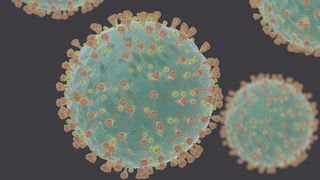Coronavirus Disease 2019
Controlling Coronavirus Anxiety
How you can take charge of fear in the midst of the COVID-19 crisis.
Posted March 9, 2020 Reviewed by Gary Drevitch

The novel coronavirus has now made it to every continent except Antarctica. As it continues to spread, we are constantly inundated with updates on the virus and the latest death tolls. Understandably, this can be overwhelming. Here are some things you can do if you are feeling anxious about this public health crisis.
1. Do what you can to prepare.
According to the CDC and the World Health Organization (WHO), there are some steps you can take to reduce the risk of contracting the novel coronavirus. Most are common-sense measures, like washing your hands thoroughly, disinfecting commonly used household surfaces (such as doorknobs and light switches), keeping hands away from your face, and steering clear of others who are coughing or sneezing.
In addition, try to keep yourself in good health so that your immune system functions at its best. Simple practices like eating a variety of fruits and vegetables, exercising regularly, and keeping up with regular preventative care can go a long way. Make sure that you are up to date with recommended immunizations, especially those that protect against flu and pneumonia as these illnesses can make you more susceptible to the novel coronavirus. Influenza and pneumonia can also cause additional serious complications if you contract them along with or as a complication of coronavirus. Talk with your doctor to determine if you require additional immunizations.
2. Limit exposure to the news.
There are an incredible number of news outlets and an even more endless supply of information available on social media. If you are anxious about COVID-19, you may find yourself spending a lot of time searching for updates and reassurance. This is usually counterproductive, as many outlets and social media networks draw on catastrophic or sensational stories to get views. Limit yourself to checking news stories once a day. Turn off automatic news notifications on your smartphone. Trust that if there is an important development, you will hear about it quickly.
3. Be wary of where you are getting information.
Where you get your news also matters. Make sure to use reliable sources, like the CDC, WHO, or major news outlets. Do not trust updates on social media without thoroughly investigating the source. Remember that no news source can provide information on your own personal risk of contracting or having serious complications from the novel coronavirus. To best understand this, consider talking with your primary care doctor or other healthcare provider.
4. Practice mindfulness and cognitive behavioral therapy (CBT) techniques.
Our minds are made to protect us. As such, we are biased toward attending to potential threats. When you find yourself swept up in thinking about the scary things that could happen, it’s important to remember this tendency to overestimate the likelihood of a bad outcome. Yes, it is possible that something bad could happen. Acknowledge these worries, but practice refocusing your mind on the present. Starting a formal mindfulness meditation practice can help you develop the skills to do this. (For more on how to apply mindfulness and CBT techniques to this recent public health crisis, see this post by Seth Gillihan.)
5. Connect with others, even if you can't do so physically.
It is important to continue engaging with others, especially during times of crisis. Even if you can't physically meet up, reach out with a phone call or video call like FaceTime or Skype when you are feeling stressed. Many people are feeling the same anxiety, and reaching out can help to normalize your fears and learn how others are coping.
6. Treat underlying mental illness.
For people with existing conditions like depression, anxiety, and obsessive-compulsive disorder, news of COVID-19 may increase symptoms. Feelings of helplessness, panic, contamination fears, health-related anxiety, and generalized anxiety can all be worsened by epidemics and other similar disasters. It is important to make sure that your underlying mental illness is adequately treated. If you notice that your mental health is suffering lately, make an appointment with your doctor and/or therapist to discuss treatment strategies.
References
Centers for Disease Control and Prevention. (2020, March 9). COVID-19 Situation Summary, Cases in the U.S. https://www.cdc.gov/coronavirus/2019-ncov/cases-in-us.html.
Centers for Disease Control and Prevention. (2020, March 6). Influenza (Flu), Preliminary In-Season 2019-202 Burden Estimates. https://www.cdc.gov/flu/about/burden/preliminary-in-season-estimates.htm
World Health Organization. (n.d.) Coronavirus disease (COVID-19) advice for the public: When and how to use masks. https://www.who.int/emergencies/diseases/novel-coronavirus-2019/advice-…
Mettler, K. (2020, March 2). 'Stop Buying Masks’: Health officials beg Americans to stop panic-shopping. The Washington Post. https://www.washingtonpost.com/health/2020/03/02/n95-face-mask-coronavi…
Faust, J. S. (2020, March 4). COVID-19 isn't as deadly as we think. Slate. https://slate.com/technology/2020/03/coronavirus-mortality-rate-lower-t…
Lipsitch, M., Donnelly, C. A., Fraser, C., Blake, I. M., Cori, A., Dorigatti, I., Ferguson, N. M., Garske, T., Mills, H. L., Riley, S., Van Kerkhove, M. D., & Hernan, M. A. (2015). Potential biases in estimating absolute and relative case-fatality risks during outbreaks. PLoS Negl Trop Dis, 9(7). doi: 10.1371/journal.pntd.0003846.


